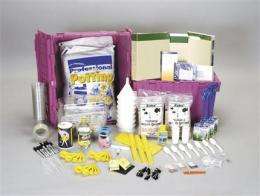Kids' science kits may take hit from safety ruling

(AP) -- One of the tools that teachers use to get kids jazzed about science - hands-on science kits - could face an uncertain future amid a debate on safety.
The Consumer Product Safety Commission has been mired for weeks in deliberation as it writes guidelines on what makes a product a "children's product" - and consequently which products would have to undergo more stringent safety testing. Caught up in the debate are those classroom science kits and some of the items they contain like paper clips to show kids how magnets work.
The science kit makers had asked for a testing exemption for the paper clips and some other materials. The commission declined to write the waiver they sought into the guidance that CPSC approved Wednesday on a split, 3-2 vote.
The guidance is supposed to help sort out which products have to be tested under legislation passed by Congress over two years ago that requires rigorous safety checks for lead, chemicals, flammability and other potential dangers.
The science kit makers argue the paper clips, rulers and other items in the kits aren't harmful to children, would be too expensive to test, and shouldn't have to be tested because they are everyday items found in homes and schools that don't have to be tested if bought separately at retail. A requirement to test, they say, would force them to refocus and market kits to older children instead of the 12-and-under crowd the law targets.
After the vote, CPSC Chairman Inez Tenenbaum sought to reassure people that "there is nothing in this rule that bans science kits."
While it doesn't ban the kits, the manufacturers say it may crimp the supply of kits for elementary school children.
"If the first introduction a student has is seventh or eighth grade, you've lost them already," said Steve Alexander, business manager for the Hands On Science Partnership, based in Denver. The costs associated with "the testing requirements would far exceed the value of the materials in the kits," he said.
The partnership is a coalition of companies that sell hands-on science educational materials.
Consumer advocates say they are sympathetic to the costs associated with the safety testing, but insist the tests must be done.
"The reason for this law is to ensure that products for children are safe," said Rachel Weintraub, director of product safety and senior counsel at the Consumer Federation of America. "The universe for where there is ambiguity on testing is a relatively small one."
The issue before the commission - coming up with a clearer definition of a children's product - has caused weeks of discussion, late-night meetings and some angst at CPSC, an agency charged with making sure that thousands of products on the market are safe. A vote on the issue has been bumped three times already.
While it's clear that an Elmo telephone toy for a toddler falls under the law and requires additional testing, there are products that linger in a gray area - such as the science kits or lamps and rugs that are decorated with fairies or trains. Those same rugs minus the fairies or trains would not have to undergo the additional, often costly testing.
The Halloween industry, for example, says a superhero costume can be worn by teenagers and adults, so it shouldn't necessarily be classified as a children's product. Handmade toy makers argued to the commission that child-sized musical instruments are similar to adult-sized instruments.
The Consumer Product Safety Improvement Act of 2008, known as CPSIA, defines a children's product as an item designed or intended primarily for children 12 years of age or younger. Since passage, critics have decried confusion in the marketplace about what products have to be tested, and how often.
More information: Consumer Product Safety Commission: http://www.cpsc.gov
©2010 The Associated Press. All rights reserved. This material may not be published, broadcast, rewritten or redistributed.
















